
[EDRM Editor’s Note: This article was first published here on December 4, 2023 and EDRM is grateful to Rob Robinson, editor and managing director of ComplexDiscovery, for permission to republish.]
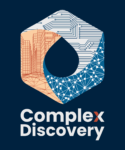
ComplexDiscovery OU’s Editor’s Note: The Winter 2024 eDiscovery Pricing Survey by ComplexDiscovery OÜ, now in its eleventh edition, continues to provide an invaluable resource for understanding the pricing dynamics within the eDiscovery ecosystem. This non-scientific survey, initiated in the winter of 2019, has evolved to become a benchmark tool for professionals in the fields of cybersecurity, information governance, and legal discovery. The survey’s methodology, emphasizing a significant response rate with minimal outreach, ensures that the findings are both comprehensive and relevant to current market conditions.
One of the survey’s strengths lies in its accumulated respondent base of 837 individuals, offering a robust and diverse perspective on pricing trends. Its focus spans across key eDiscovery tasks, such as collection, processing, and review, providing detailed insights into each segment’s cost structure. The survey’s approach, combining direct questions with options for alternative pricing models, reflects the evolving nature of the eDiscovery landscape, acknowledging the increasing complexity and specialization of services.
The results of the Winter 2024 survey with 76 respondents are particularly telling, highlighting a shift towards more flexible and technology-adaptive pricing models. This shift is indicative of the industry’s response to emerging challenges and opportunities, such as the growing volume of digital data and the advancement of technologies like predictive coding in document review.
It’s important to note that while the survey offers a comprehensive overview of pricing trends, its non-scientific nature means it should be used as a guide rather than a definitive pricing standard. The survey results provide valuable insights for eDiscovery professionals, assisting them in making informed decisions and strategically navigating the complex pricing landscape of eDiscovery services.
Industry Research
Shaping eDiscovery Strategies: Winter 2024 Pricing Report*
ComplexDiscovery Staff
The Winter 2024 eDiscovery Pricing Survey, executed by ComplexDiscovery OÜ and drawing on the perspectives of 76 industry professionals, offers a thorough and focused analysis of the prevailing pricing trends within the eDiscovery ecosystem. This survey, part of an ongoing series since 2019, has successfully built a comprehensive data set with contributions from 837 individual responses across eleven surveys. It meticulously explores the pricing intricacies associated with key eDiscovery tasks, including collection, processing, and review. Each task segment reveals its own unique trends and challenges, reflecting the diverse and complex nature of eDiscovery work.
The following sections from the Winter 2024 survey delve into these specific areas, shedding light on the intricate pricing mechanisms that underpin the eDiscovery process in its entirety, offering critical insights that may greatly benefit professionals engaged in cybersecurity, information governance, and legal discovery.
Detailed Collection Pricing Analysis (Figures 1-3)
Collection, a fundamental phase in eDiscovery, involves diverse tasks performed by forensic examiners. The survey provides an intricate look into the costs associated with these services.
- Onsite Collection: The majority of respondents (68.4%) indicate the per hour cost for onsite collection by a forensic examiner falls between $250 and $350. This cost bracket reflects the need for specialized skills, equipment, and often, the urgency associated with onsite data collection.
- Remote Collection: In contrast, remote collection, which has gained traction due to technological advancements and increased efficiency, shows a slight reduction in costs. About 63.2% of professionals cite costs between $250 and $350 per hour, while 15.8% report less than $250, illustrating the cost benefits of remote operations.
- Device-Specific Collections: Desktop and laptop collections, as well as mobile device collections, are noted for their higher costs. A significant 51.3% quote more than $350 per device for desktop/laptop collections, while mobile device collection costs are similarly high, with 50.0% quoting above $350 per device. These figures highlight the technical complexities and expertise required in handling varied data sources.
- Investigative Services and Expert Testimony: Investigative services, including analysis and report generation, command a high value, with 53.9% charging between $350 and $550 per hour. The cost for expert witness testimony is even higher, with 26.3% exceeding $550 per hour, reflecting the premium placed on specialized legal expertise and credibility in judicial proceedings.
Comprehensive Processing Pricing Analysis (Figures 4-9)
Processing ESI is a critical step in eDiscovery, involving the organization and preparation of data for review. The survey’s findings in this segment shed light on the cost dynamics based on data volumes and processing stages.
- Cost Efficiency in Large Volume Processing: Notably, for volumes over 251 GB, processing costs at ingestion stage are less, with 32.9% of the responses indicating less than $25 per GB. This trend towards lower costs for larger volumes persists at the completion of processing, where 46.1% charge less than $100 per GB. These figures underscore the economies of scale in eDiscovery, where handling larger data sets becomes relatively cost-effective.
- Alternative Pricing Models: The survey also highlights a shift towards alternative pricing models in processing, with 19.7% of respondents favoring these for both ingestion and completion stages. This trend reflects a growing inclination towards pricing strategies that are tailored to the specific needs of each project, taking into account factors like data complexity and processing requirements.
Project management plays a pivotal role in the successful execution of eDiscovery projects, and its pricing is a key component of the overall cost structure.
- Basic Project Management: The survey reveals that the majority (56.6%) of respondents charge between $100 and $200 per hour for basic project management support. This cost bracket suggests that even fundamental project management tasks in eDiscovery require a significant investment, underscoring the importance of efficient coordination and oversight in these projects.
- Advanced Project Management: For more complex and demanding project management tasks, the costs escalate. The survey shows that a substantial proportion (64.5%) of professionals charge over $200 per hour for advanced project management support. This higher cost reflects the specialized skills and in-depth involvement required to manage intricate aspects of eDiscovery projects, such as handling complex data types, navigating legal intricacies, or coordinating extensive teams.
In-Depth Review Pricing Analysis (Figures 10-12)
Document review, a labor-intensive and critical phase in eDiscovery, has its own unique pricing trends, as revealed by the survey.
- Predictive Coding in TAR: The use of predictive coding in technology-assisted review (TAR) is seeing a shift in pricing models. A substantial 39.5% for datasets under 250 GB and 40.8% for larger datasets suggest alternative pricing models, moving away from the traditional per GB pricing. This indicates an adaptation to the evolving technological landscape in document review, recognizing the specialized nature and varying complexities of predictive coding.
- Cost Variations in Document Review: The survey reveals notable differences in the costs for onsite and remote document reviews. Remote reviews are more economical, with 46.1% of responses quoting between $25 and $40 per hour, compared to onsite reviews where 48.7% exceed $40 per hour. This disparity points towards the increasing feasibility and acceptance of remote review models, which offer cost advantages and access to a broader talent pool.
- Per Document Review Costs: When it comes to per document costs for review, the survey shows a range of pricing, reflecting the meticulous nature of the task. For onsite reviews, 32.9% of respondents indicate costs greater than $1.00 per document, underlining the intensive labor and expertise required in document examination and analysis.
Demographic Breakdown: Geographical Reach, Business Segments, and Functional Roles of Respondents (Figures 13-15)
In the Winter 2024 eDiscovery Pricing Survey conducted by ComplexDiscovery OÜ, the demographics of the 76 respondents paint a vivid picture of the eDiscovery ecosystem and its diverse participants. The survey, with its broad reach and varied participant base, offers insights that are as much about the people behind the data as the data itself.
At the forefront of this demographic landscape is the overwhelming representation of professionals from the United States, who constitute 94.7% of the survey’s respondents.This significant concentration of U.S.-based professionals emphasizes the strong influence of North American practices and standards on the eDiscovery industry. It also suggests that the survey’s findings are particularly reflective of trends and sentiments within the U.S. market. While other regions like the United Kingdom, Asia/Asia Pacific, and non-UK Europe are also represented, their presence is markedly smaller, highlighting the survey’s predominantly American perspective.
Diving deeper into the professional backgrounds of the respondents, the survey captures a wide array of roles and sectors within the eDiscovery sphere. Software and services providers emerge as the largest group, accounting for 40.8% of the responses. This segment’s prominence underscores the crucial role that technology plays in eDiscovery, from software solutions to comprehensive service offerings. Law firms, making up 31.6% of the responses, stand as the second-largest group. Their substantial participation reflects the deep entwinement of legal practices with eDiscovery, given that law firms are often at the forefront of employing eDiscovery services in litigation and legal compliance.
Consultancies and corporations also contribute significantly to the survey’s respondent pool, representing 10.5% and 9.2%, respectively. These professionals bring perspectives that range from strategic advisory roles to in-house management of eDiscovery processes. Though smaller in number, their input is vital in painting a complete picture of the eDiscovery landscape.
The survey also sheds light on the primary functions of the respondents within their organizations. A majority, 69.7%, are involved in legal or litigation support roles, indicating the predominance of legal considerations in eDiscovery operations. Business and business support functions account for 27.6% of the respondents, highlighting the cross-functional nature of eDiscovery as it intersects with various business operations. Those in IT and product development roles, though forming a smaller fraction at 2.6%, underscore the importance of technology and innovation in shaping eDiscovery solutions.
In essence, the demographic data from the Winter 2024 eDiscovery Pricing Survey provides a narrative of the eDiscovery industry’s composition and its evolving dynamics. The strong U.S. presence, coupled with the diverse range of professional roles and sectors represented, reveals an industry that is both deeply rooted in legal practices and progressively influenced by technological advancements. This rich tapestry of respondents not only lends credibility to the survey’s findings but also ensures that the insights gleaned are well-rounded and reflective of the multifaceted nature of eDiscovery.
Adapting to New Pricing Realities in eDiscovery
The Winter 2024 eDiscovery Pricing Survey offers a comprehensive and detailed view of the pricing landscape across various eDiscovery services. It highlights the industry’s gradual shift towards more flexible, adaptive, and cost-efficient models in collection, processing, and review services. The insights from this survey are crucial for eDiscovery professionals, providing benchmarks and guiding principles for informed decision-making and strategic planning in this complex field.
eDiscovery Pricing Survey Responses
n=76 Respondents
Collection Pricing
1a. What is the per hour cost for an onsite collection by a forensic examiner?
- Less than $250 per hour. 5.3%
- Between $250 and $350 per hour. 68.4%
- Greater than $350 per hour. 9.2%
- Do not know. 13.2%
- Alternative pricing model for per hour costs. 3.9%
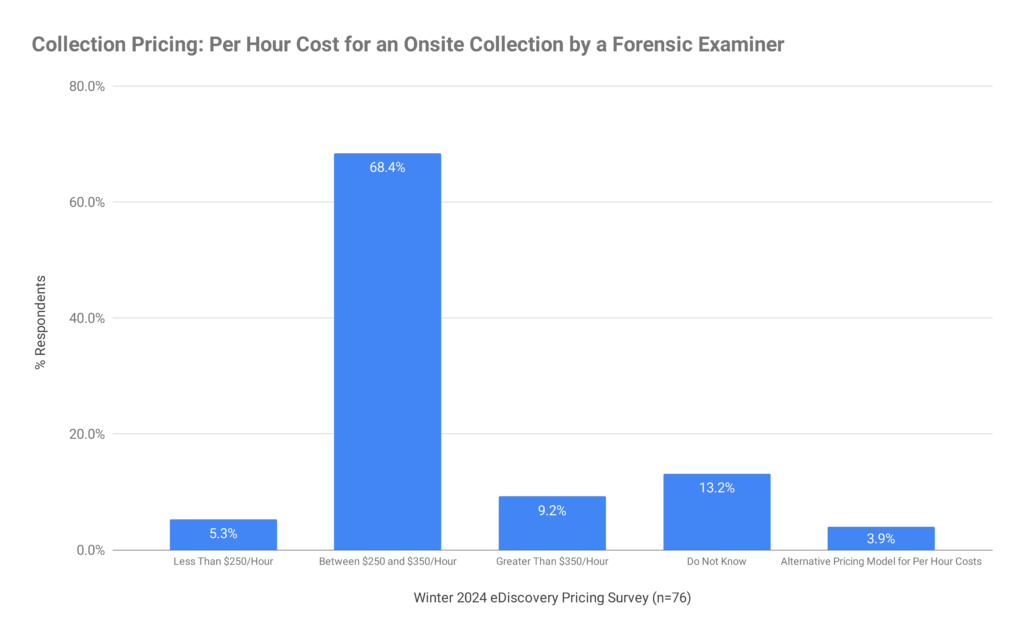
1b. What is the per hour cost for a remote collection by a forensic examiner?
- Less than $250 per hour. 15.8%%
- Between $250 and $350 per hour. 63.2%
- Greater than $350 per hour. 2.6%
- Do not know. 11.8%
- Alternative pricing model for per hour costs. 6.6%
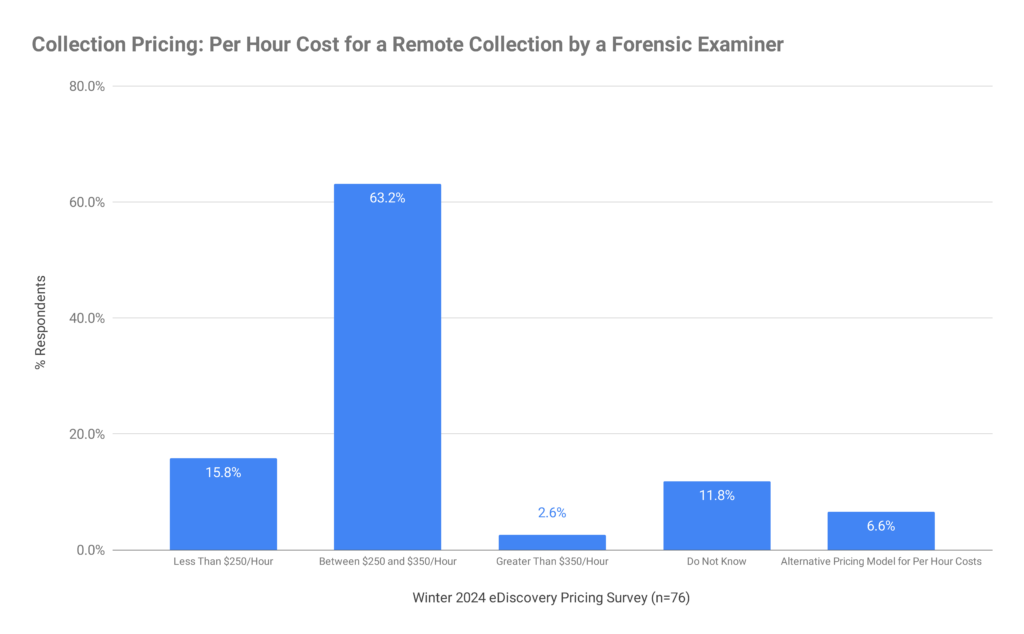
2a. What is the per device cost for a desktop or laptop computer collection by a forensic examiner?
- Less than $250 per device. 3.9%
- Between $250 and $350 per device. 15.8%
- Greater than $350 per device. 51.3%
- Do not know. 18.4%
- Alternative pricing model for per device costs. 10.5%
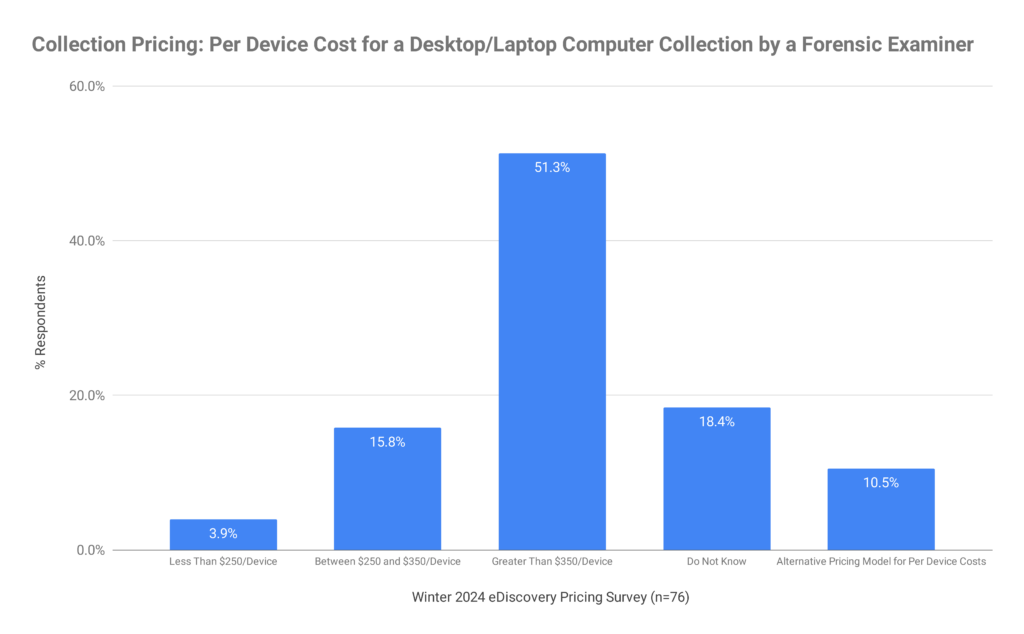
2b. What is the per device cost for a mobile device collection by a forensic examiner?
- Less than $250 per device. 3.9%
- Between $250 and $350 per device. 26.3%
- Greater than $350 per device. 50.0%
- Do not know. 14.5%
- Alternative pricing model for per device costs. 5.3%
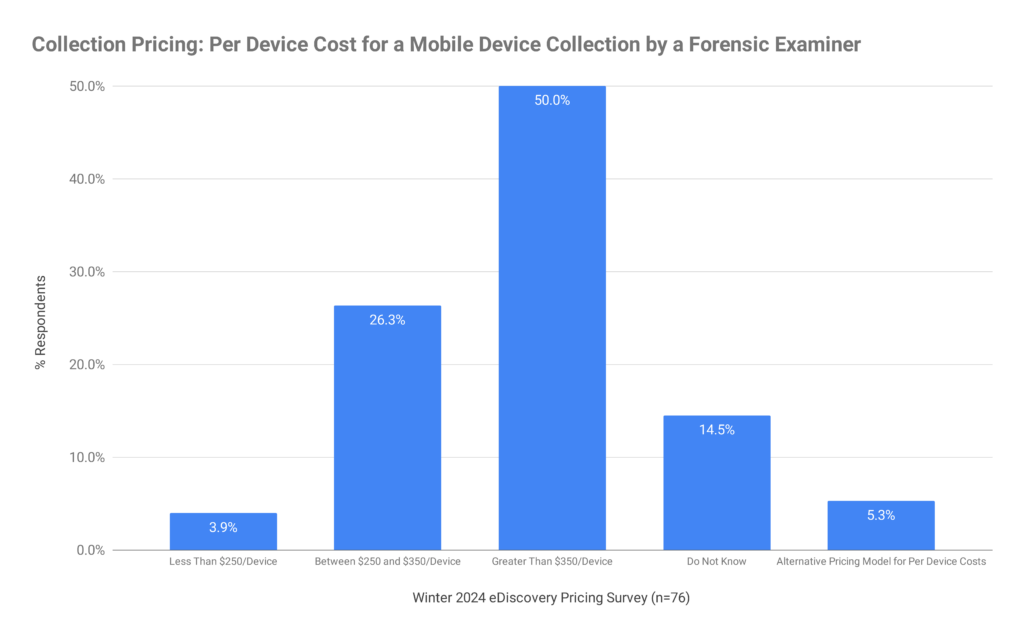
3a. What is the per hour cost for investigation, analysis, and report generation by a forensic examiner?
- Less than $350 per hour. 27.6%
- Between $350 and $550 per hour. 53.9%
- Greater than $550 per hour. 1.3%
- Do not know. 13.2%
- Alternative pricing model for per hour costs. 3.9%
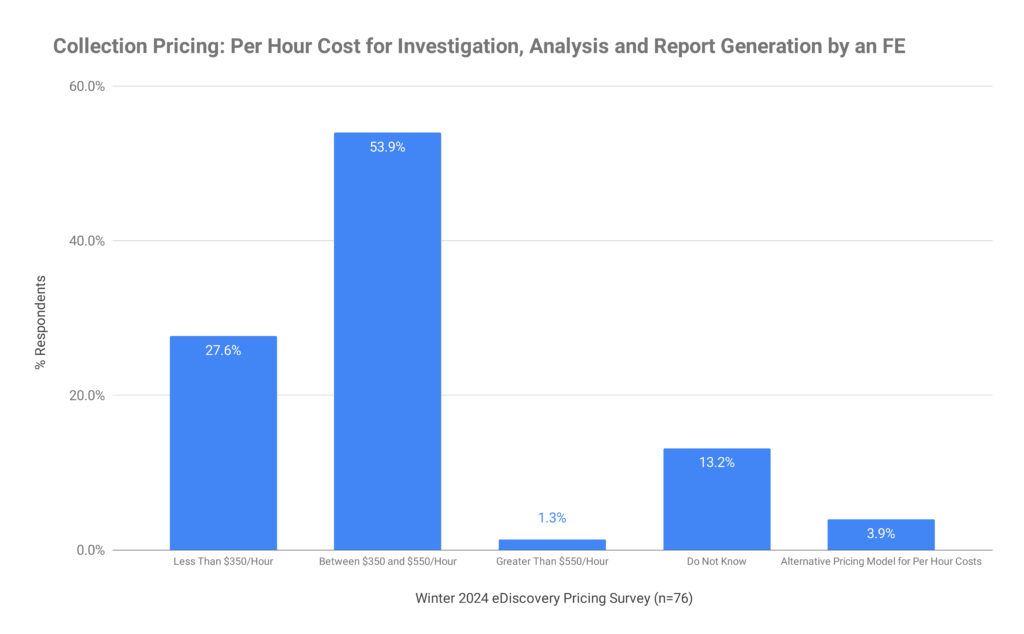
3b. What is the per hour cost for expert witness testimony (in-person and written) by a forensic examiner?
- Less than $350 per hour. 6.6%
- Between $350 and $550 per hour. 51.3%
- Greater than $550 per hour. 26.3%
- Do not know. 11.8%
- Alternative pricing model for per hour costs. 3.9%
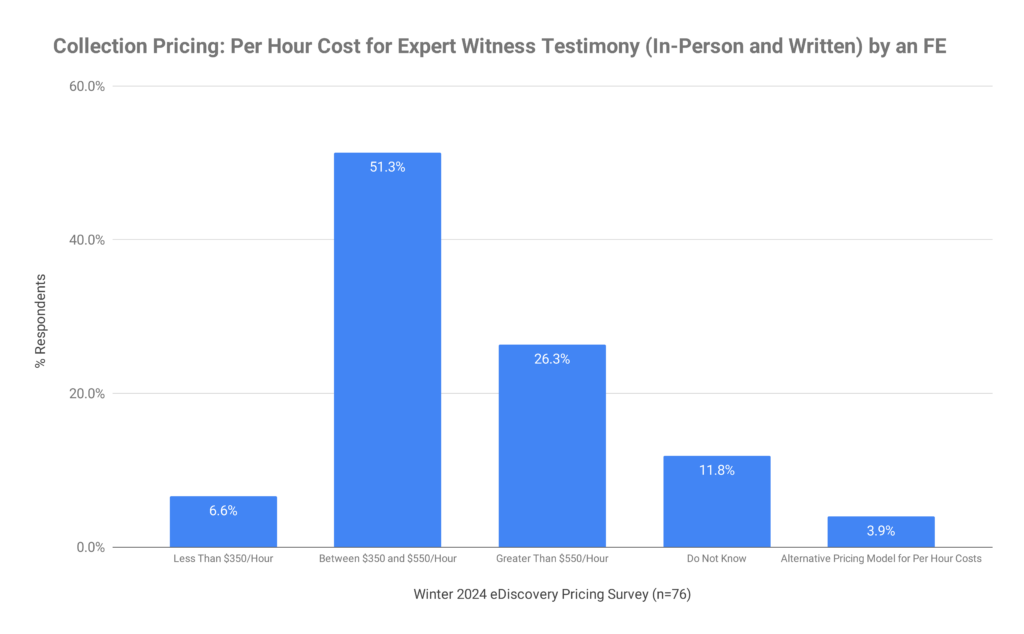
Image: ComplexDiscovery OU
Processing Pricing
4a. What is the per GB cost to process electronically stored information based on volume at ingestion for 250 GB or less?
- Less than $25 per GB. 23.7%
- Between $25 and $75 per GB. 38.2%
- Greater than $75 per GB. 6.6%
- Do not know. 11.8%
- Alternative pricing model for per GB costs. 19.7%
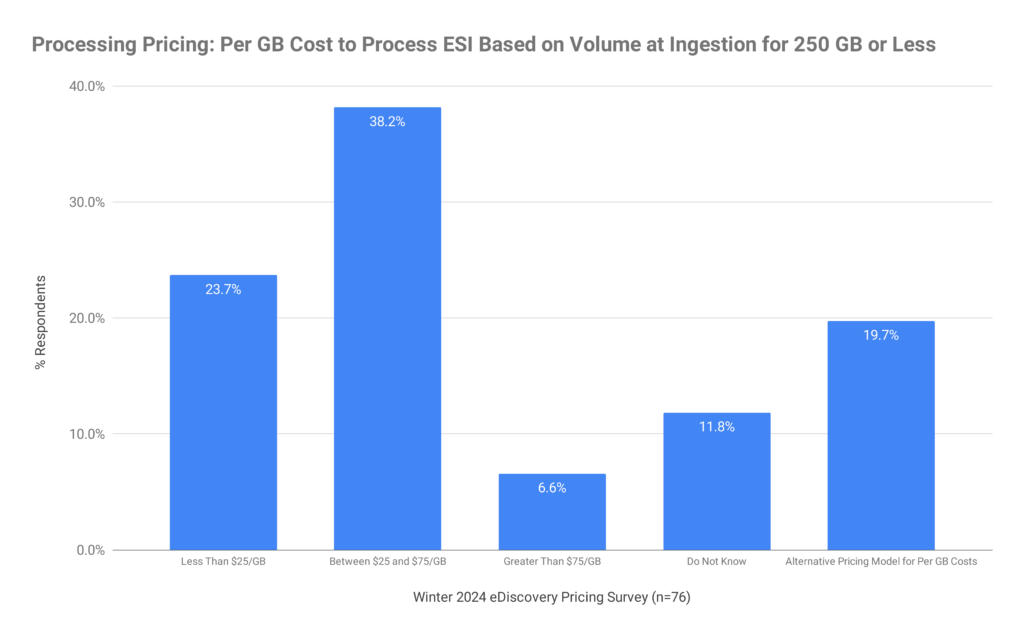
Image: ComplexDiscovery OU
4b. What is the per GB cost to process electronically stored information based on volume at ingestion for 251 GB or more?
- Less than $25 per GB. 32.9%
- Between $25 and $75 per GB. 31.6%
- Greater than $75 per GB. 2.6%
- Do not know. 13.2%
- Alternative pricing model for per GB costs. 19.7%
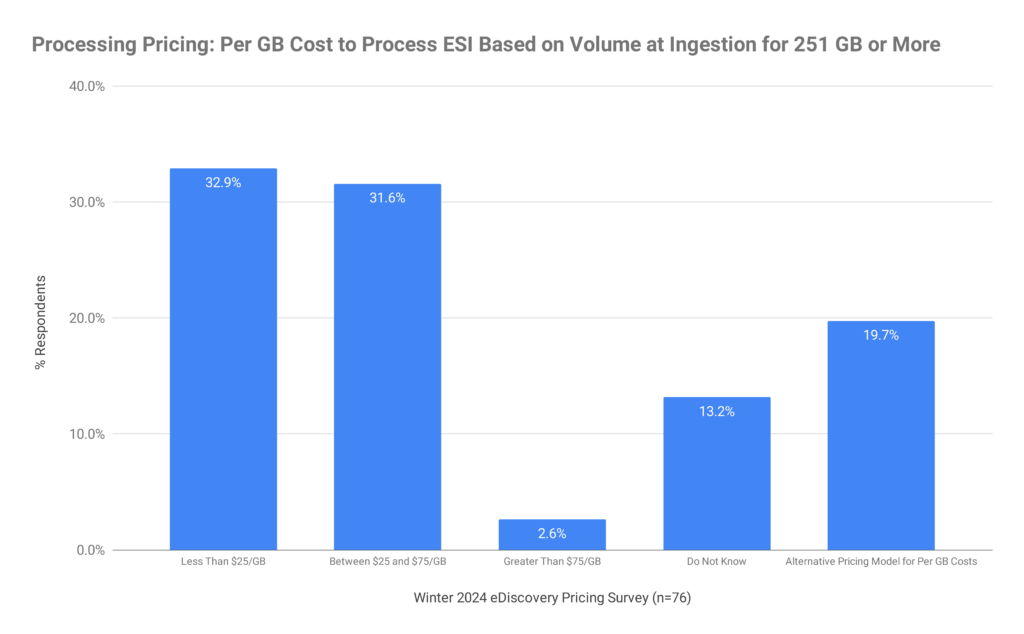
Image: ComplexDiscovery OU
5a. What is the per GB cost to process electronically stored information based on volume at completion of processing for 250 GB or less?
- Less than $100 per GB. 42.1%
- Between $100 and $150 per GB. 18.4%
- Greater than $150 per GB. 3.9%
- Do not know. 15.8%
- Alternative pricing model for per GB costs. 19.7%
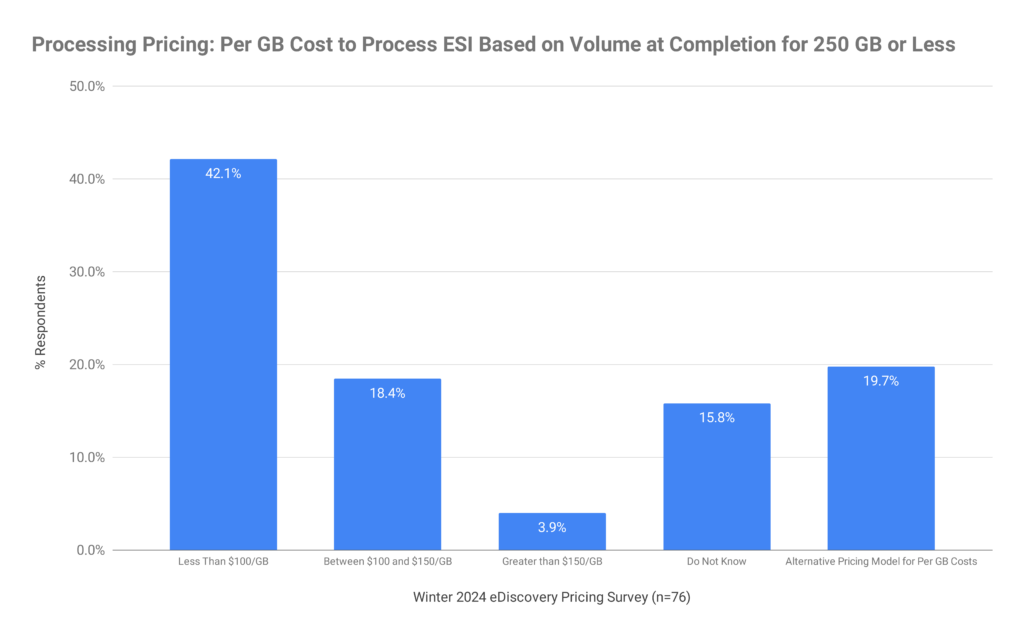
Image: ComplexDiscovery OU
5b. What is the per GB cost to process electronically stored information based on volume at completion of processing for 251 GB or more?
- Less than $100 per GB. 46.1%
- Between $100 and $150 per GB. 14.5%
- Greater than $150 per GB. 1.3%
- Do not know. 14.5%
- Alternative pricing model for per GB costs. 23.7%
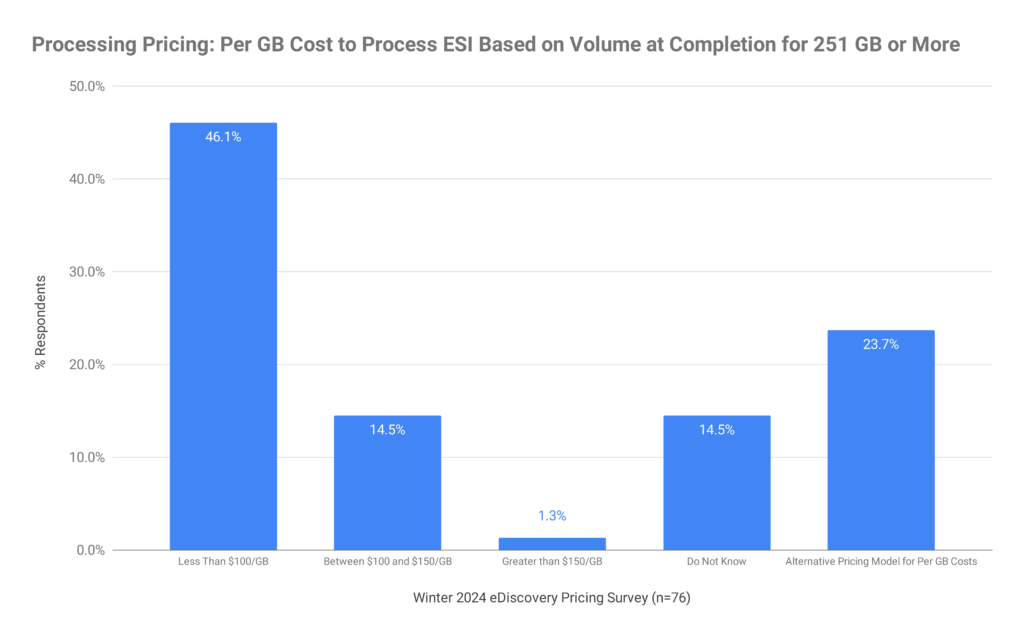
Image: ComplexDiscovery OU
6a. What is the per GB per month cost to host electronically stored information without analytics for 250 GB or less?
- Less than $10 per GB per month. 28.9%
- Between $10 and $20 per GB per month. 42.1%
- Greater than $20 per GB per month. 5.3%
- Do not know. 10.5%
- Alternative pricing model for per GB costs. 13.2%
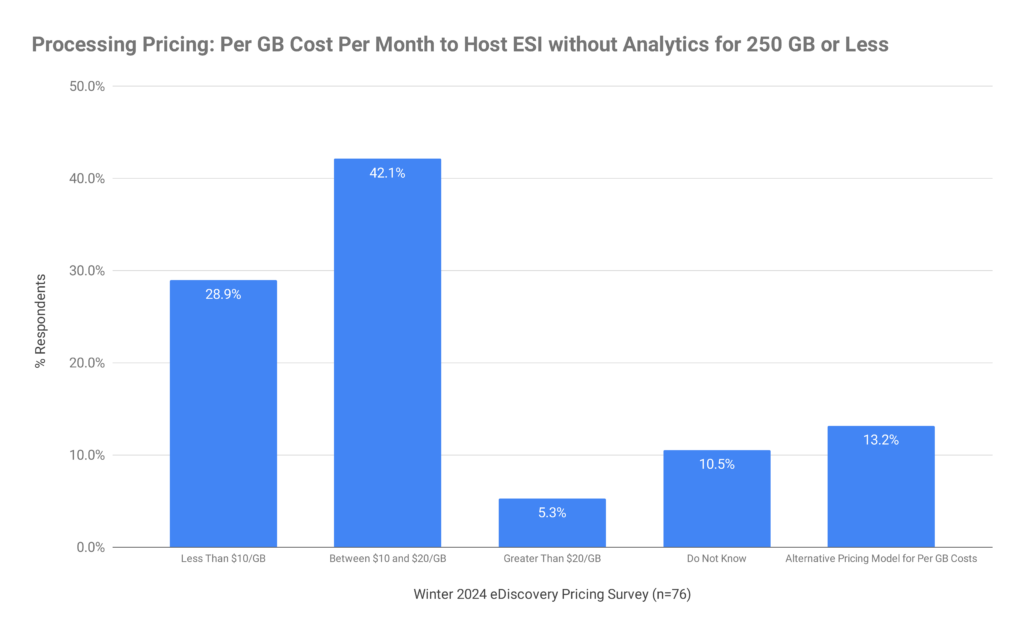
Image: ComplexDiscovery OU
6b. What is the per GB per month cost to host electronically stored information without analytics for 251 GB or more?
- Less than $10 per GB per month. 34.2%
- Between $10 and $20 per GB per month. 42.1%
- Greater than $20 per GB per month. 2.6%
- Do not know. 7.9%
- Alternative pricing model for per GB costs. 13.2%
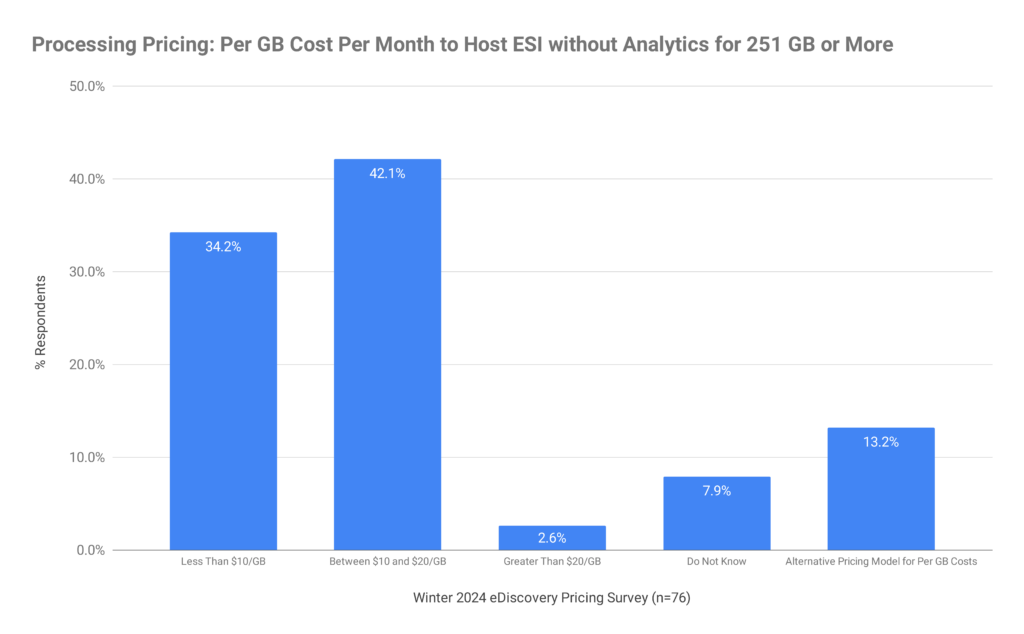
Image: ComplexDiscovery OU
7a. What is the per GB per month cost to host electronically stored information with analytics for 250 GB or less?
- Less than $15 per GB per month. 35.5%
- Between $15 and $25 per GB per month. 27.6%
- Greater than $25 per GB per month. 10.5%
- Do not know. 10.5%
- Alternative pricing model for per GB costs. 15.8%
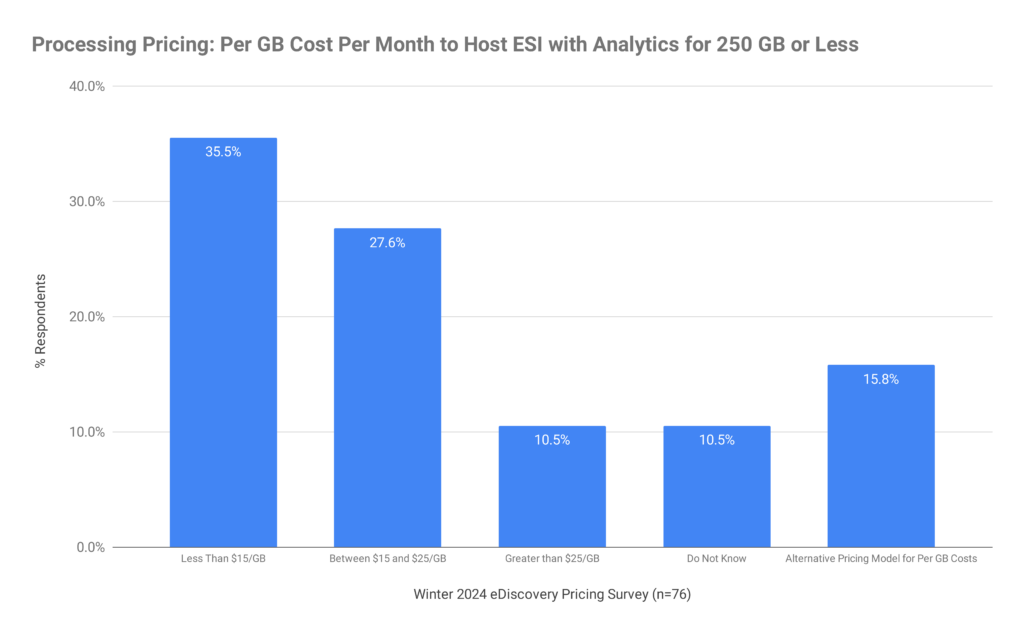
Image: ComplexDiscovery OU
7b. What is the per GB per month cost to host electronically stored information with analytics for 251 GB or more?
- Less than $15 per GB per month. 42.1%
- Between $15 and $25 per GB per month. 23.7%
- Greater than $25 per GB per month. 6.6%
- Do not know. 10.5%
- Alternative pricing model for per GB costs. 17.1%
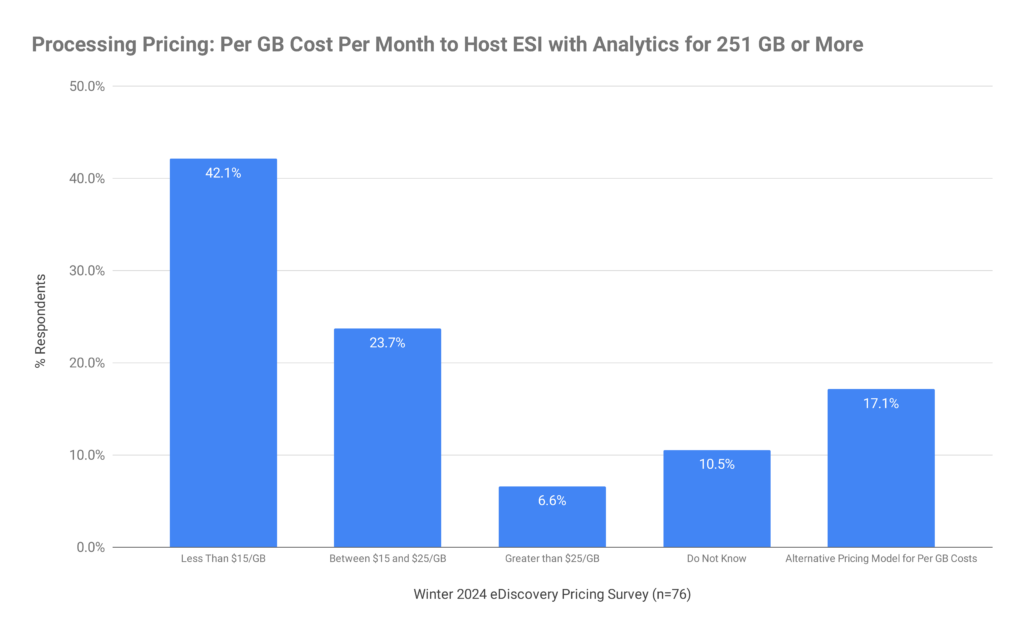
Image: ComplexDiscovery OU
8a. What is the user license fee per month for access to hosted data for 250 users or less?
- Less than $50 per user per month. 5.3%
- Between $50 and $100 per user per month. 55.3%
- Greater than $100 per user per month. 13.2%
- Do not know. 10.5%
- Alternative pricing model for user license costs. 15.8%
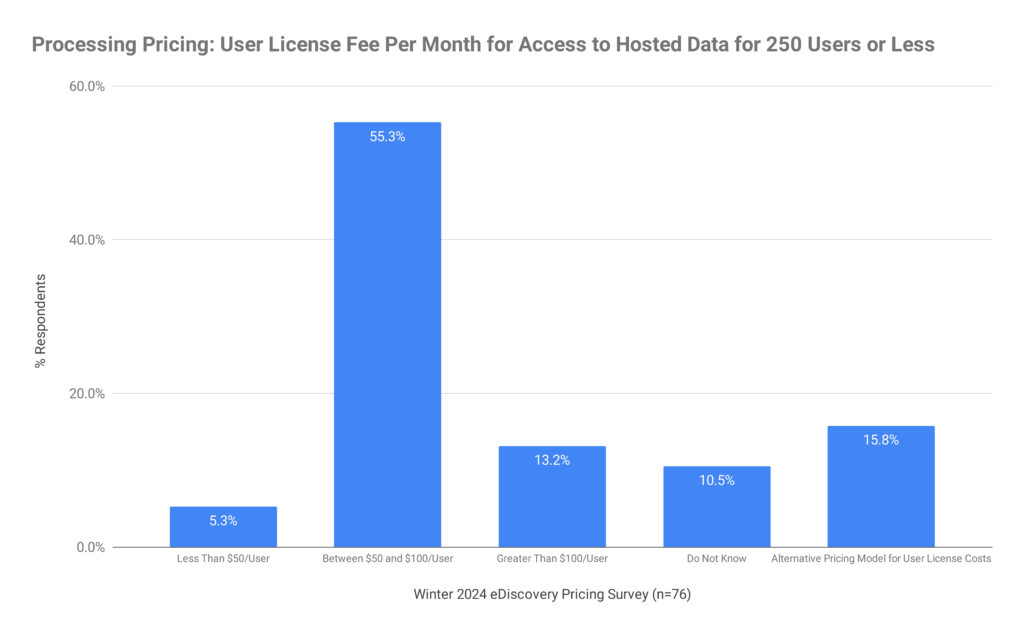
Image: ComplexDiscovery OU
8b. What is the user license fee per month for access to hosted data for 251 users or more?
- Less than $50 per user per month. 6.6%
- Between $50 and $100 per user per month. 51.3%
- Greater than $100 per user per month. 11.8%
- Do not know. 14.5%
- Alternative pricing model for user license costs. 15.8%
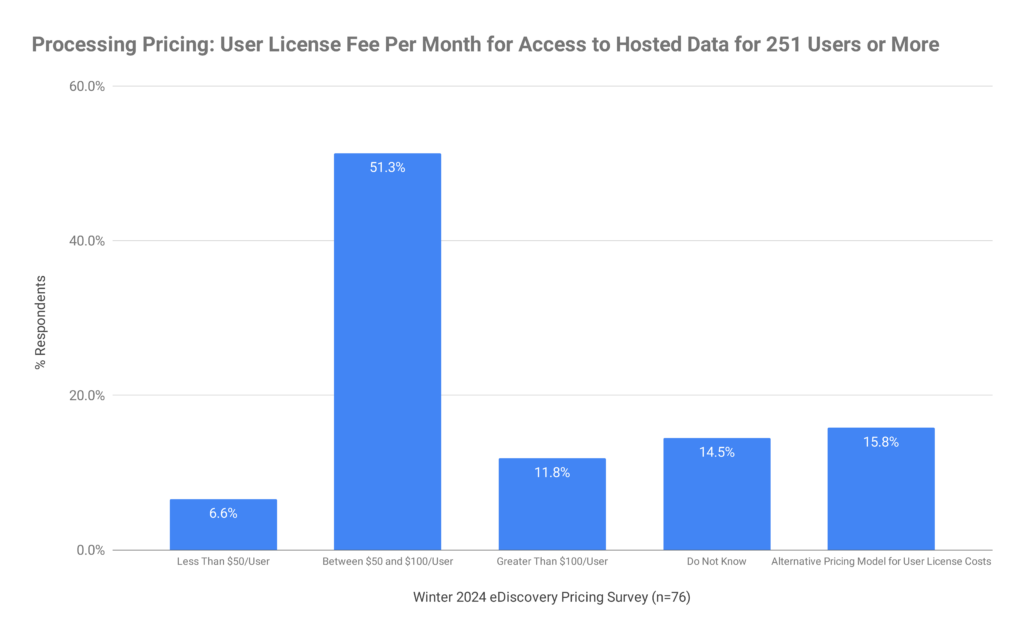
Image: ComplexDiscovery OU
9a. What is the per hour cost of basic project management support for eDiscovery?
- Less than $100 per hour. 2.6%
- Between $100 and $200 per hour. 56.6%
- Greater than $200 per hour. 27.6%
- Do not know. 7.9%
- Alternative pricing model for per hour costs. 5.3%
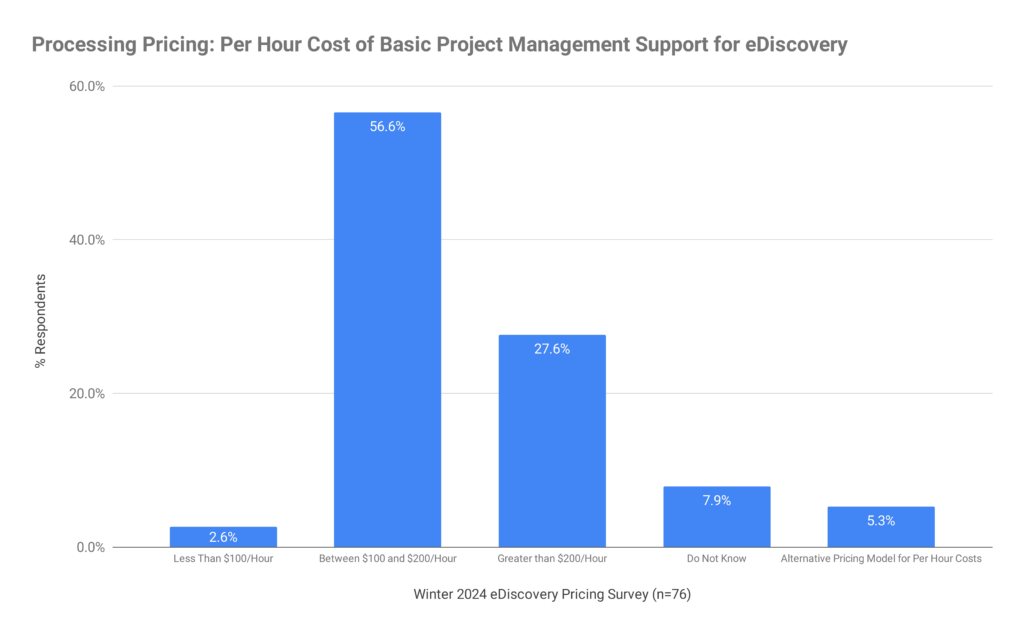
Image: ComplexDiscovery OU
9b. What is the per hour cost of advanced project management support for eDiscovery?
- Less than $100 per hour. 1.3%
- Between $100 and $200 per hour. 23.7%
- Greater than $200 per hour. 64.5%
- Do not know. 6.6%
- Alternative pricing model for per hour costs. 3.9%
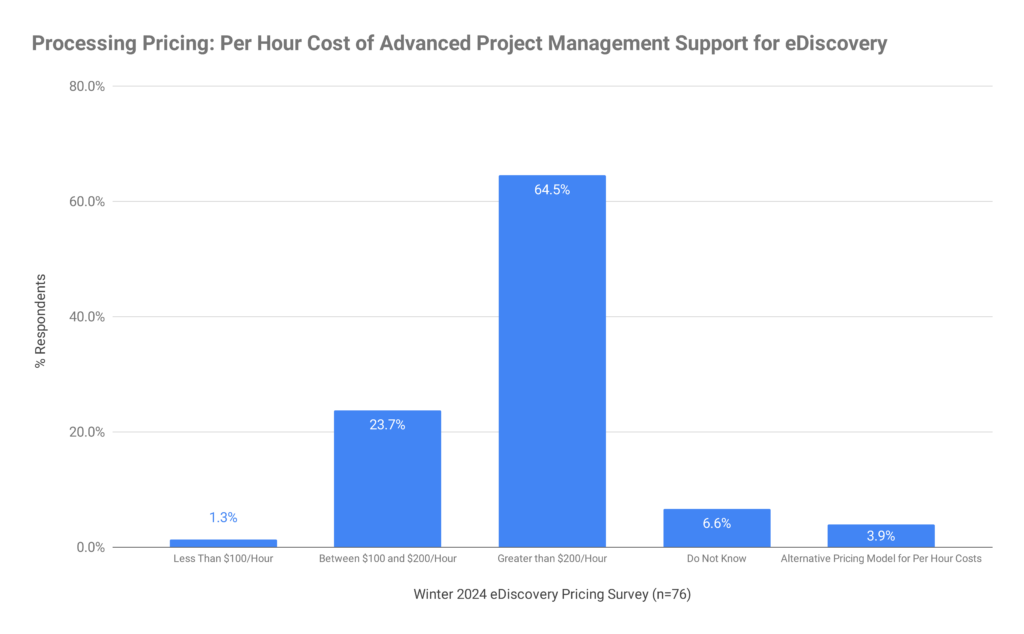
Image: ComplexDiscovery OU
Review Pricing
10a. What is the per GB cost to conduct predictive coding as part of a technology-assisted review for 250 GB or less?
- Less than $75 per GB. 21.1%
- Between $75 and $150 per GB. 9.2%
- Greater than $150 per GB. 3.9%
- Do not know. 26.3%
- Alternative pricing model for per GB costs. 39.5%
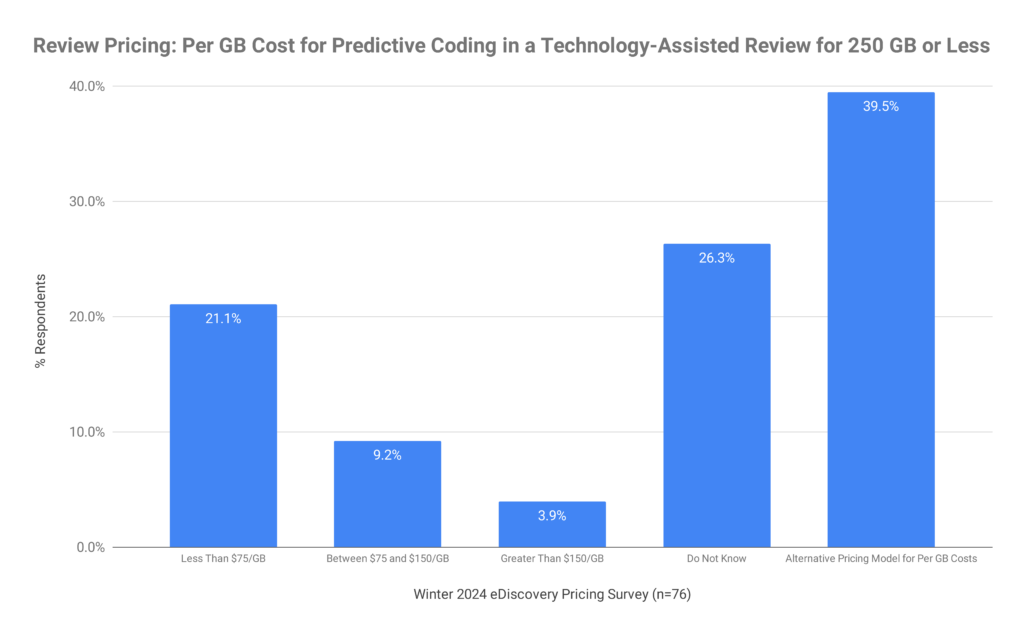
Image: ComplexDiscovery OU
10b. What is the per GB cost to conduct predictive coding as part of a technology-assisted review for 251 GB or more?
- Less than $75 per GB. 23.7%
- Between $75 and $150 per GB. 6.6%
- Greater than $150 per GB. 2.6%
- Do not know. 26.3%
- Alternative pricing model for per GB costs. 40.8%
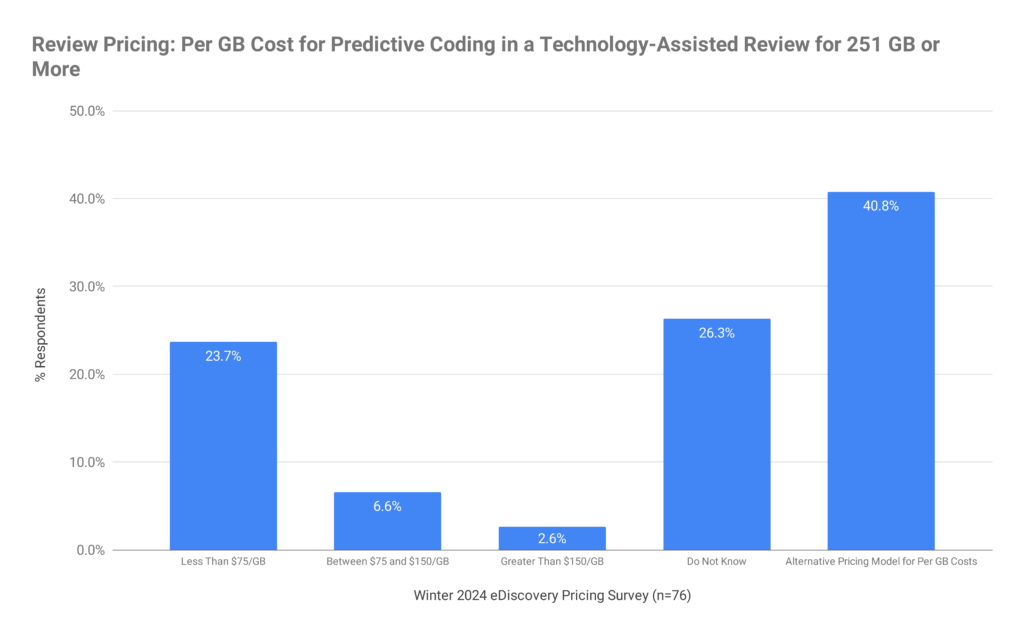
Image: ComplexDiscovery OU
11a. What is the cost per hour for document review attorneys to review documents for an onsite managed review?
- Less than $25 per hour. 1.3%
- Between $25 and $40 per hour. 23.7%
- Greater than $40 per hour. 48.7%
- Do not know. 19.7%
- Alternative pricing model for per hour costs. 6.6%
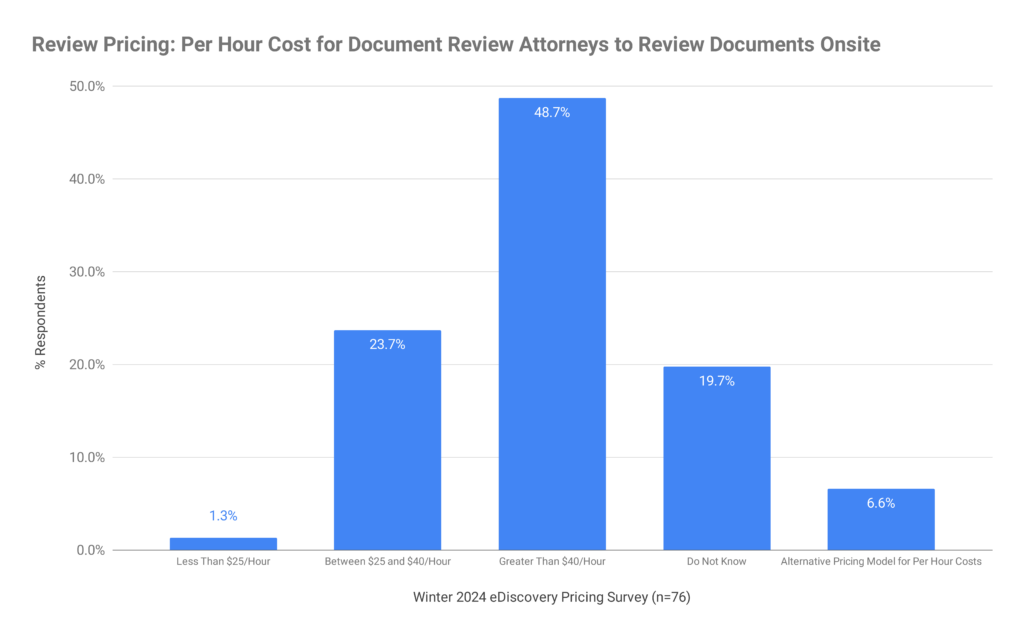
Image: ComplexDiscovery OU
11b. What is the cost per hour for document review attorneys to review documents for a remote managed review?
- Less than $25 per hour. 1.3%
- Between $25 and $40 per hour. 46.1%
- Greater than $40 per hour. 31.6%
- Do not know. 14.5%
- Alternative pricing model for per hour costs. 6.6%
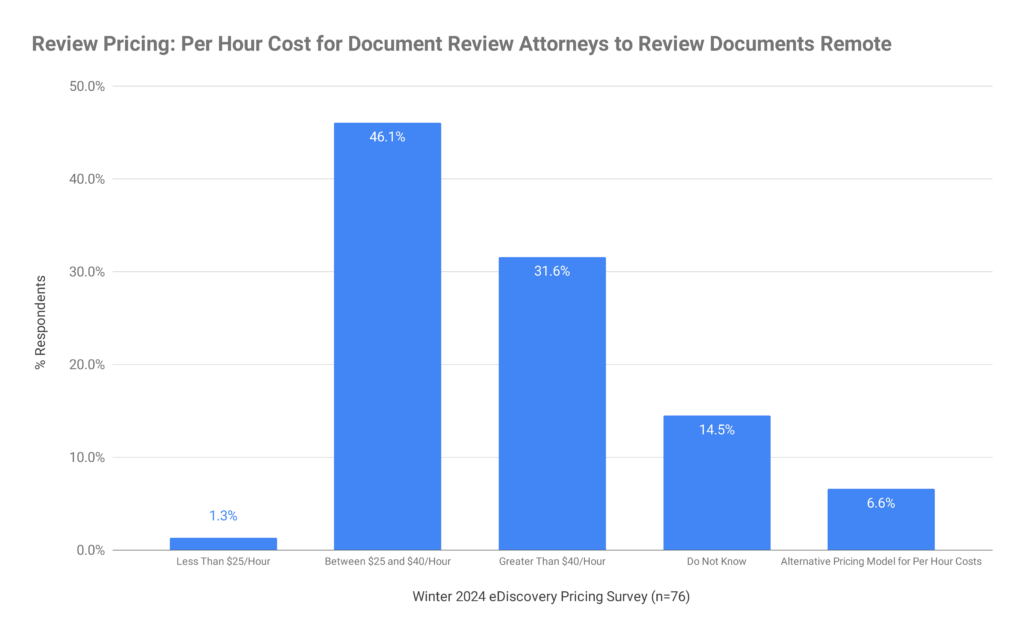
Image: ComplexDiscovery OU
12a. What is the cost per document for document review attorneys to review documents for an onsite managed review?
- Less than $0.50 per document. 3.9%
- Between $0.50 and $1.00 per document. 17.1%
- Greater than $1.00 per document. 32.9%
- Do not know. 27.6%
- Alternative pricing model for per document costs. 18.4%
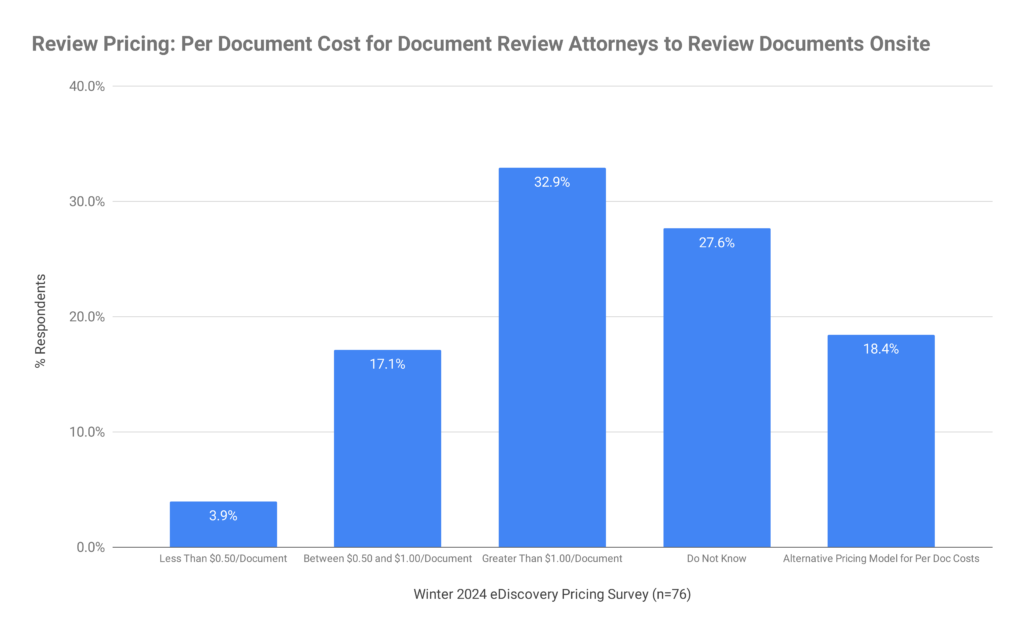
Image: ComplexDiscovery OU
12b. What is the cost per document for document review attorneys to review documents for a remote managed review?
- Less than $0.50 per document. 6.6%
- Between $0.50 and $1.00 per document. 27.6%
- Greater than $1.00 per document. 23.7%
- Do not know. 25.0%
- Alternative pricing model for per document costs. 17.1%
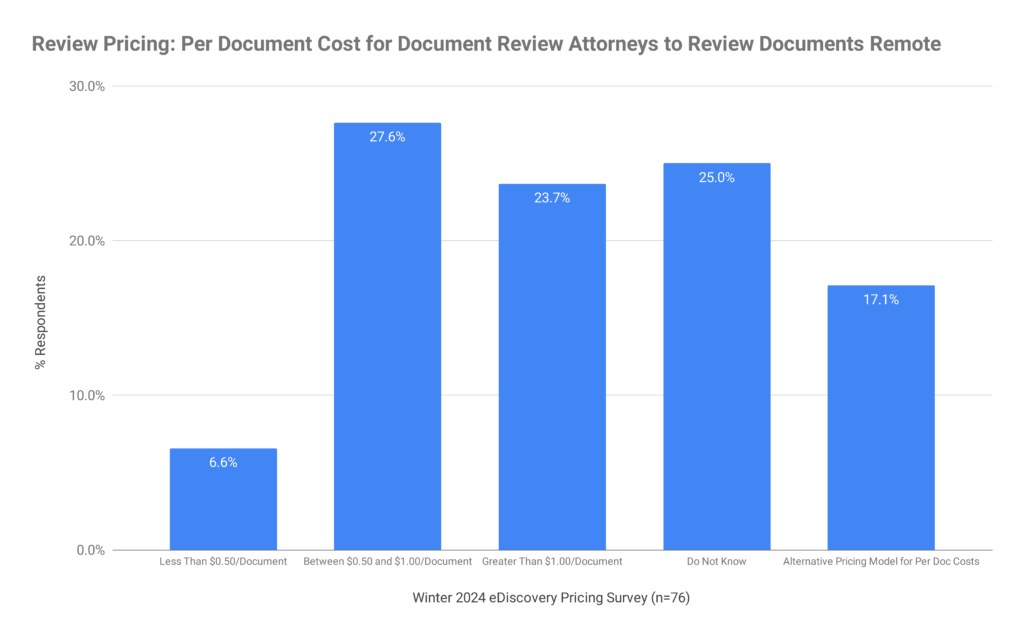
Image: ComplexDiscovery OU
Background Information
13. In which geographical region do you primarily conduct eDiscovery-related business?
- North America – United States. 94.7%
- Europe – United Kingdom. 2.6%
- Asia/Asia Pacific. 1.3%
- Europe – Non-UK. 1.3%
- North America – Canada. 0.0%
- Middle East/Africa. 0.0%
- Central/South America. 0.0%
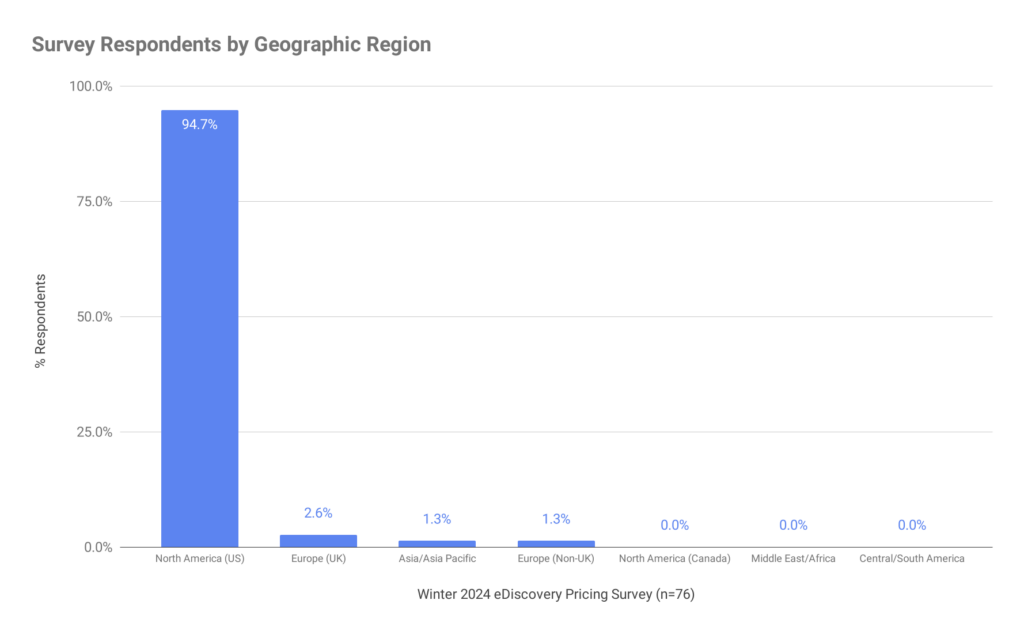
Image: ComplexDiscovery OU
14. Which of the following segments best describes your business in eDiscovery?
- Software and/or Services Provider. 40.8%
- Law Firm. 31.6%
- Consultancy. 10.5%
- Corporation. 9.2%
- Media/Research Organization/Educational Association. 7.9%
- Government Entity. 0.0%
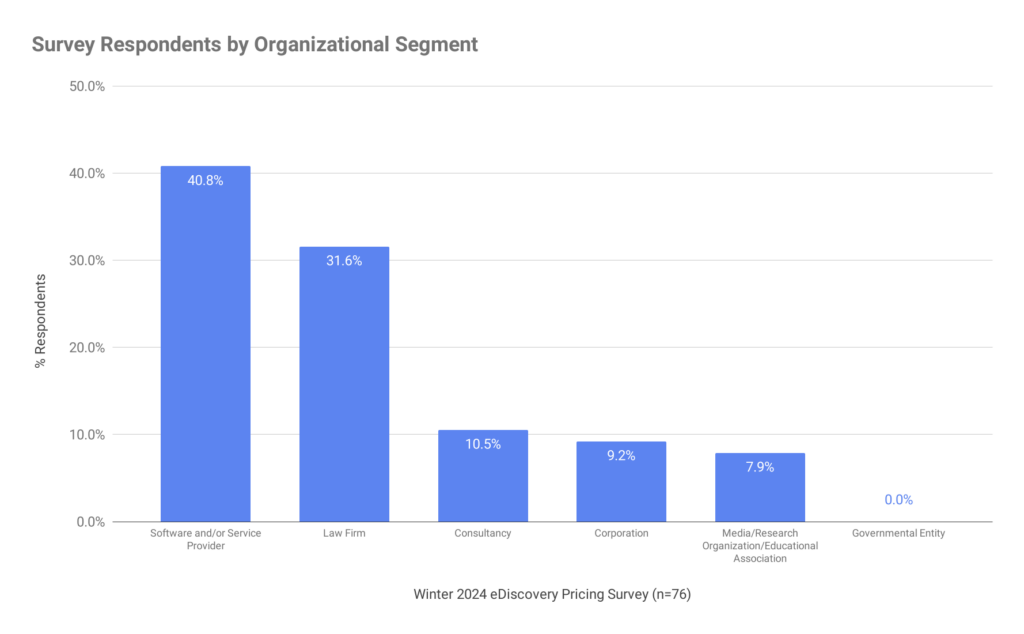
Image: ComplexDiscovery OU
15. What area best describes your primary function in the conduct of your organization’s eDiscovery business?
- Legal/Litigation Support. 69.7%
- Business/Business Support (All Other Business Functions). 27.6%
- IT/Product Development. 2.6%
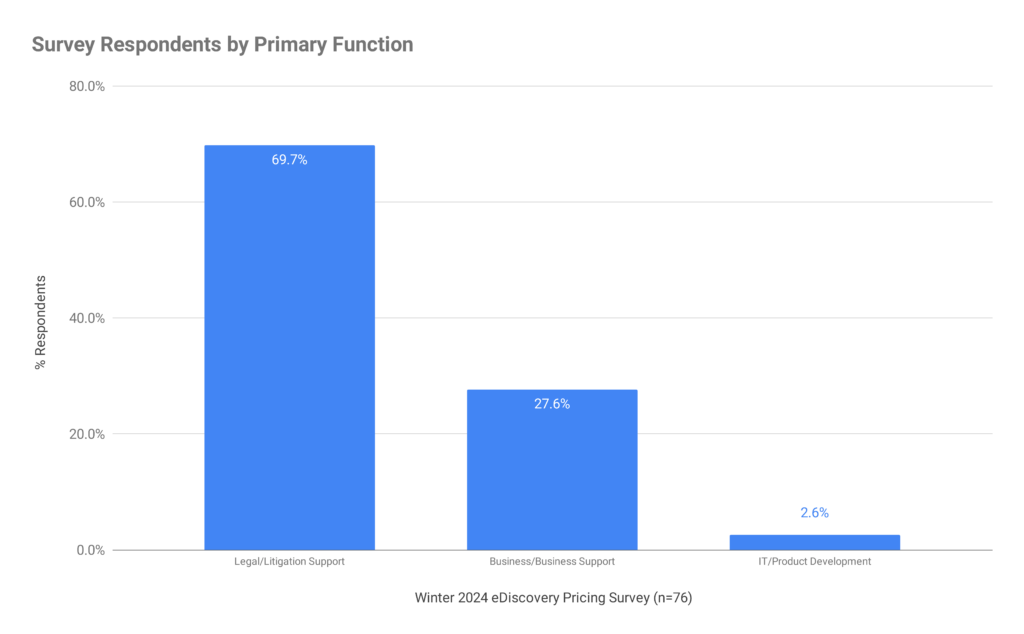
Image: ComplexDiscovery OU
Background: eDiscovery Pricing Survey Respondents by Survey
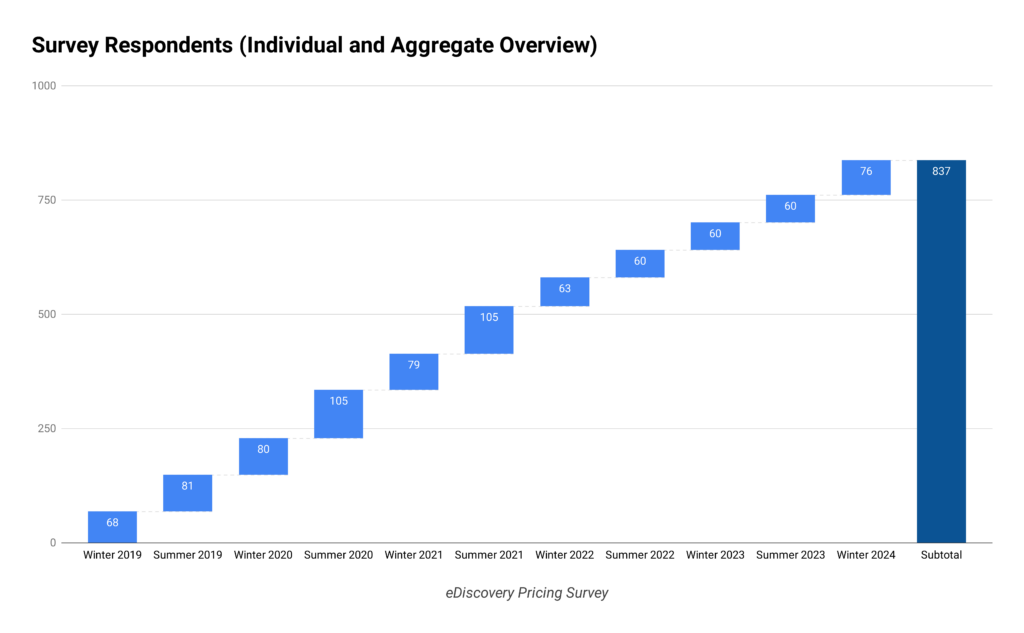
Image: ComplexDiscovery OU
*For the purpose of this ongoing industry survey, price and cost are used interchangeably and represent the amount a customer is willing to pay for the service. However, from a financial and accounting perspective, pricing is the amount a customer is willing to pay. The cost is typically the expense incurred for creating and delivering the service.
**Survey methodology focused on achieving at least 50 responses with the least number of emails sent to the ComplexDiscovery and EDRM industry professional databases. This approach sought to minimize the number of requests for survey participation while ensuring a solid number of responses from which to generally assess market sentiment in survey areas of interest.
Assisted by GAI and LLM Technologies per EDRM GAI and LLM Policy.
Additional Reading
- Peaks and Valleys? Summer 2023 eDiscovery Pricing Survey Results
- Adaptation and Stratification? Winter 2023 eDiscovery Pricing Survey Results
- ComplexDiscovery Business Confidence Surveys
Source: ComplexDiscovery

Generative Artificial Intelligence and Large Language Model Use
ComplexDiscovery OÜ recognizes the value of GAI and LLM tools in streamlining content creation processes and enhancing the overall quality of its research, writing, and editing efforts. To this end, ComplexDiscovery OÜ regularly employs GAI tools, including ChatGPT, Claude 2, Midjourney, and DALL-E3, to assist, augment, and accelerate the development and publication of both new and revised content in posts and pages published (initiated in late 2022).
Read the ComplexDiscovery GAI and LLM Policy
ComplexDiscovery also provides a ChatGPT-powered AI article assistant for its users. This feature leverages LLM capabilities to generate relevant and valuable insights related to specific page and post content published on ComplexDiscovery.com. By offering this AI-driven service, ComplexDiscovery OÜ aims to create a more interactive and engaging experience for its users, while highlighting the importance of responsible and ethical use of GAI and LLM technologies.

